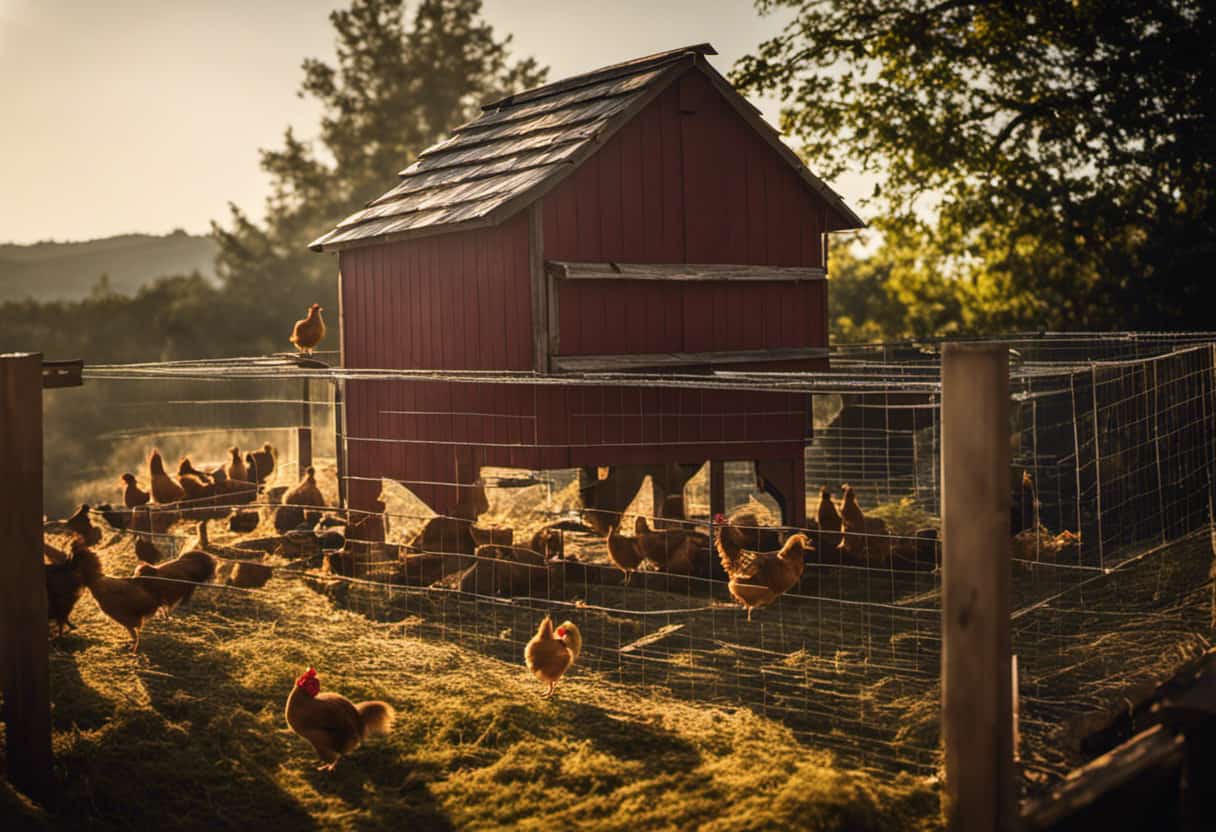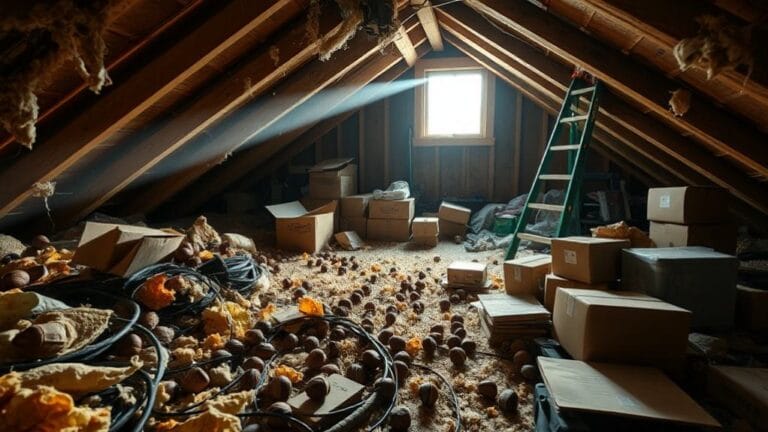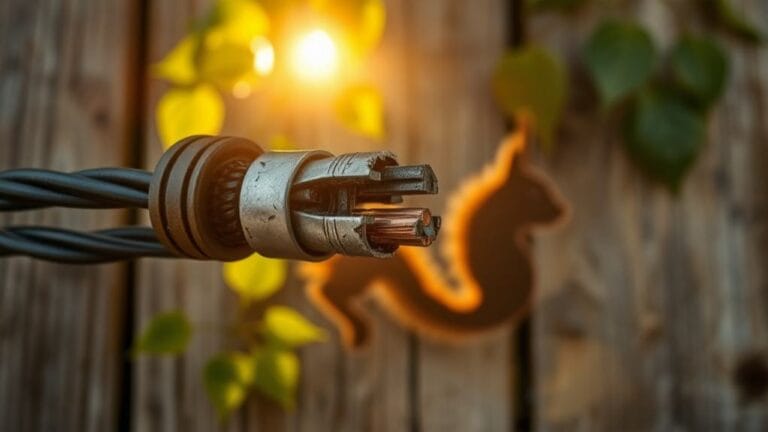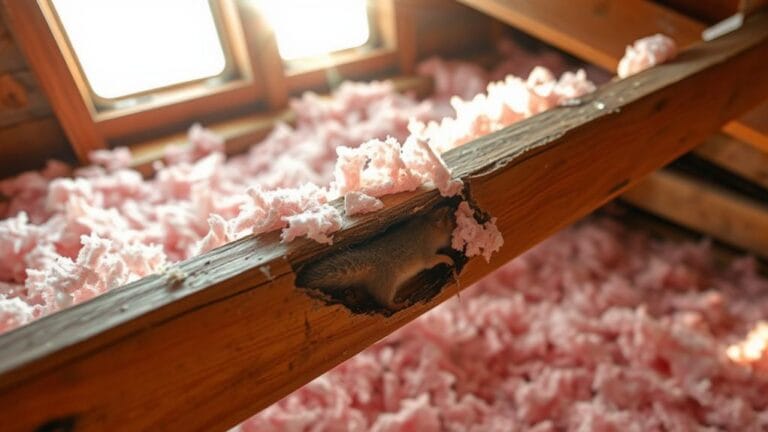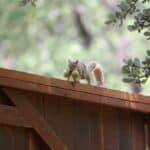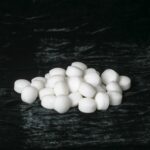Tired of those pesky critters raiding your chicken feed? Well, fret no more! We’ve got the ultimate guide to help you keep those squirrels out of your precious feed.
From identifying common entry points to implementing natural deterrents, we’ve got you covered. With our practical tips and tricks, you’ll be able to secure your chicken feed storage and install physical barriers like a pro.
Say goodbye to those furry intruders once and for all with our squirrel-proof feeders and regular maintenance tips. Let’s get started!
Key Takeaways
Table of Contents
- Identify and prevent entry points by checking for gaps or holes in the coop walls or flooring and blocking access points with physical barriers like wire mesh or fencing.
- Secure the chicken feed storage by using a lock on the feed container, choosing a sturdy lock and durable material for the container, placing it on an elevated platform, and surrounding it with a squirrel-proof barrier like wire mesh or fencing.
- Implement natural deterrents and physical barriers such as planting mint or thorny bushes, sprinkling cayenne pepper or chili powder, hanging shiny objects, and using strong-smelling deterrents like peppermint oil or vinegar.
- Utilize squirrel-proof feeders and feeder placement strategies such as using feeders that close off access to the seed when detecting a squirrel’s weight, using baffles or cages around the feeder, placing it in a difficult-to-reach location, regularly cleaning the feeder, and using sturdy materials that squirrels cannot chew through.
Understanding the Squirrel Problem
Understanding the squirrel problem can help you find effective solutions to keep them out of your chicken feed.
Squirrels are highly agile and curious creatures, known for their ability to climb trees and jump long distances. They are also opportunistic feeders, meaning they will take advantage of any available food source, including your chicken feed.
Squirrel behavior includes digging, chewing, and foraging, which can have a significant impact on your chicken feed consumption. Squirrels can not only consume a large amount of feed themselves, but their presence can also attract other squirrels and pests, leading to even more feed loss.
It is essential to understand their behavior and the impact they have on your chicken feed to effectively address the squirrel problem and protect your chicken’s food source.
Identifying Common Entry Points
When it comes to keeping squirrels out of your chicken feed, it’s important to identify the key entry points that these pesky critters are using. By knowing where they are getting in, you can take the necessary steps to prevent their access.
In this discussion, we will explore the common entry points that squirrels use and provide practical tips on how to effectively block their path.
Key Entry Points
To keep squirrels out of your chicken feed, you’ll want to identify the key entry points where they may be accessing the feed. Understanding squirrel behavior is crucial in tackling this issue.
Squirrels are agile climbers and skilled at jumping, so look for any overhanging branches near the chicken coop or feed storage areas. These branches can serve as their bridges to reach the feed. Additionally, check for any gaps or holes in the coop walls or flooring where squirrels can squeeze through.
Once you’ve identified these entry points, it’s time to employ natural squirrel repellents. Some effective options include using strong-smelling deterrents such as peppermint oil or vinegar around the coop area. You can also sprinkle cayenne pepper or garlic powder around the feed to deter squirrels.
Preventing Squirrel Access
Identify the key areas where squirrels may be accessing your chicken feed to prevent their access.
Squirrels are agile and persistent creatures, always on the lookout for a tasty treat. To prevent squirrel damage and protect your chicken feed, it is crucial to deter them effectively.
Start by securing any openings in your chicken coop, such as gaps in the walls or roof. Squirrels can squeeze through surprisingly small spaces, so be thorough in your inspection.
Consider installing metal barriers or wire mesh around the base of your feed storage containers to prevent squirrels from chewing through them.
Additionally, keep your feed storage area clean and free of spilled grain or seeds, as these can attract squirrels.
Securing the Chicken Feed Storage
One way you can secure the chicken feed storage is by using a lock on the container. Securing feed containers is essential to prevent rodents and other pests from accessing the feed.
When it comes to rodent proofing storage areas, a lock on the container is an effective solution. By using a lock, you ensure that the feed remains safe and inaccessible to unwanted critters. It is important to choose a sturdy lock that is resistant to tampering.
Additionally, make sure the container is made of durable material that cannot be easily chewed through. By taking these precautions, you can be confident that your chicken feed storage is secure and protected from rodents.
Implementing Natural Deterrents
Using natural deterrents is an effective way to keep squirrels away from your chicken feed storage. These natural deterrent options are not only safe for your chickens but also environmentally friendly.
Here are some homemade squirrel repellents that you can try:
Plant mint around the chicken feed storage area. Squirrels dislike the strong scent of mint and will avoid the area.
Sprinkle cayenne pepper or chili powder around the storage area. The spicy smell will deter squirrels from getting near the feed.
Hang shiny objects such as CDs or aluminum foil strips near the storage area. The reflection and movement will confuse and scare away squirrels.
Installing Physical Barriers
Installing a fence or mesh around the storage area is an effective way to prevent squirrels from accessing the chicken feed. By creating a physical barrier, you can keep these pesky critters away from the delicious food meant for your chickens.
When choosing a fence or mesh, make sure it is sturdy and has small enough gaps to prevent squirrels from squeezing through. Additionally, consider implementing electronic deterrents to further enhance your squirrel-proof feeding area. These devices emit ultrasonic sounds or vibrations that irritate and deter squirrels from approaching. Place them strategically around the storage area to maximize their effectiveness.
Utilizing Squirrel-Proof Feeders
When it comes to keeping squirrels out of your bird feeders, there are a few key points to consider.
First, effective feeder designs can greatly reduce the chances of squirrel access. Look for feeders with mechanisms that close off access to the seed when a squirrel’s weight is detected.
Second, preventing squirrel access can also be achieved by using baffles or cages around the feeder.
Effective Feeder Designs
To keep squirrels out of your chicken feed, try a feeder design that includes a protective covering. This design will effectively deter squirrels from accessing the feed while allowing your chickens easy access. Here are some effective feeder designs to consider:
Hanging feeders with a dome-shaped cover: This design prevents squirrels from climbing onto the feeder and reaching the feed. The dome shape also helps to shield the feed from rain and other elements.
Weight-activated feeders: These feeders are designed to only open when a chicken steps on a platform, activating the mechanism. This ensures that only the chickens can access the feed while keeping squirrels out.
Tilt-activated feeders: Similar to weight-activated feeders, these designs require the chicken to tilt the feeder to access the feed. Squirrels, on the other hand, are unable to tilt the feeder and thus are kept away from the feed.
Preventing Squirrel Access
If you want to effectively prevent squirrels from accessing your chicken feed, one option is to use a feeder design with a protective covering. Squirrel proofing techniques are essential to ensure that your chickens get the nutrition they need without sharing it with pesky critters.
DIY squirrel deterrents can be a cost-effective and efficient way to keep these furry intruders at bay. One popular method is to construct a wire mesh cage that fits over the feeder, allowing only the chickens to access the food.
Another option is to use PVC piping and create a feeding tube that only allows the chickens’ small heads to fit through. Adding a baffle to your feeder is also effective, as it prevents squirrels from climbing up and accessing the feed.
Feeder Placement Strategies
Properly positioning your feeder is crucial for minimizing squirrel interference and ensuring easy access for your chickens. By following these simple strategies, you can effectively prevent squirrels from stealing your chicken feed:
Height: Place the feeder at least 5 feet off the ground to discourage squirrels from reaching it. They’re agile climbers but prefer easier food sources at lower levels.
Distance: Position the feeder away from trees, fences, or any other structures that squirrels can use as launching pads. A minimum distance of 10 feet is recommended.
Obstacles: Install baffles or squirrel guards on the feeder pole to make it more difficult for squirrels to access the feed. These obstacles can be slippery or have a cone-shaped design to deter them.
Alternative feeding options can also help reduce squirrel interference. Consider using treadle feeders or hanging feeders with adjustable height settings. These options limit access to the feed, allowing only your chickens to enjoy their meals undisturbed.
Regular Maintenance and Inspection
Regularly check for any holes or gaps in the chicken coop to prevent squirrels from accessing the feed. Regular maintenance and inspection are essential in keeping your chicken feed safe from these pesky critters.
Start by conducting a thorough examination of the coop, paying close attention to areas where squirrels could potentially enter. Look for any signs of damage or wear and tear, such as loose boards or broken wires. Seal any holes or gaps with sturdy materials like wire mesh or metal sheeting.
Additionally, inspect the surrounding area for overhanging tree branches or structures that squirrels could use as a launchpad. Trim back branches and remove any potential access points.
Frequently Asked Questions
Can I Use Any Type of Physical Barrier to Keep Squirrels Out of the Chicken Feed?
You can use physical barriers like wire mesh or metal containers to keep squirrels out of the chicken feed. Alternatively, you can try deterrents like sprinkling cayenne pepper or using squirrel repellent.
How Often Should I Inspect and Maintain the Squirrel-Proof Feeders?
To keep squirrels out of your chicken feed, it’s important to have a regular inspection schedule and maintenance routine for your squirrel-proof feeders. This will help ensure their effectiveness and keep your chickens fed.
Are There Any Natural Deterrents That Are Harmful to Chickens?
Natural deterrents can be effective in keeping squirrels away from chicken feed, but it’s important to ensure they are safe for the chickens. Consider using methods like peppermint oil or cayenne pepper, which are harmless to chickens.
Can Squirrels Chew Through Metal or Plastic Containers Used for Chicken Feed Storage?
Squirrels love to chew on things, and they can definitely chew through metal or plastic containers used for chicken feed storage. It’s important to find a solution to keep them out!
Are There Any Specific Signs or Indicators That Squirrels Have Been Accessing the Chicken Feed Storage?
To prevent squirrels from accessing your chicken feed storage, it’s important to be aware of signs indicating their presence. Look for chewed holes, scattered feed, or squirrel droppings near the storage area.
Conclusion
So there you have it, my friend! Now you’re armed with all the knowledge you need to keep those pesky squirrels away from your precious chicken feed.
By understanding the squirrel problem, identifying common entry points, securing the storage, implementing natural deterrents, installing physical barriers, utilizing squirrel-proof feeders, and conducting regular maintenance and inspections, you’ll be able to enjoy your chicken feed in peace.
So go ahead, put these practical tips into action, and wave goodbye to those furry little thieves!
Happy chicken feeding!

